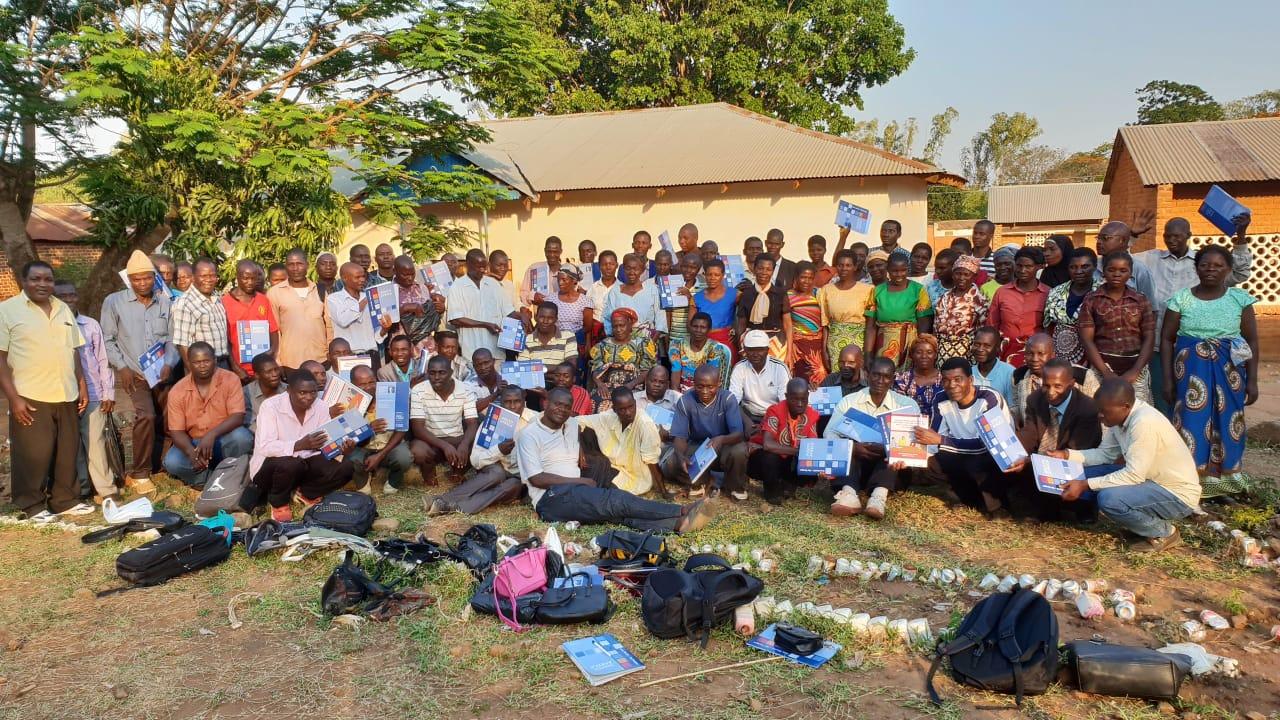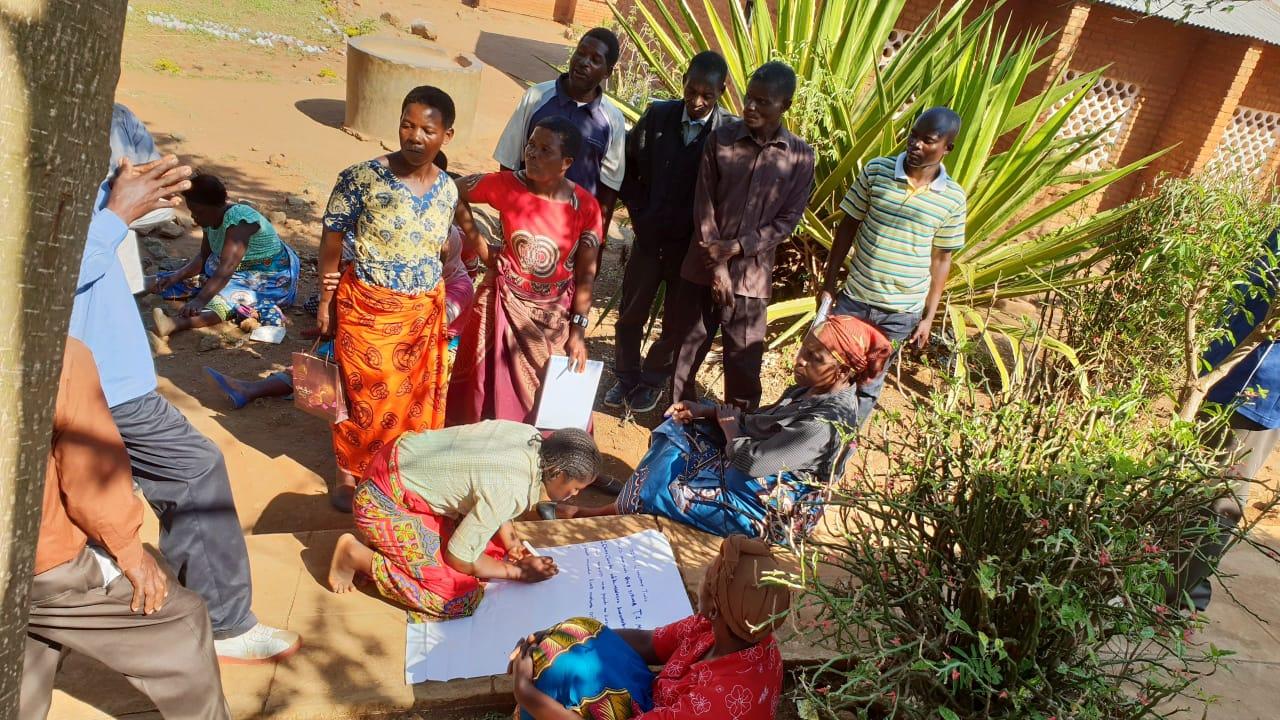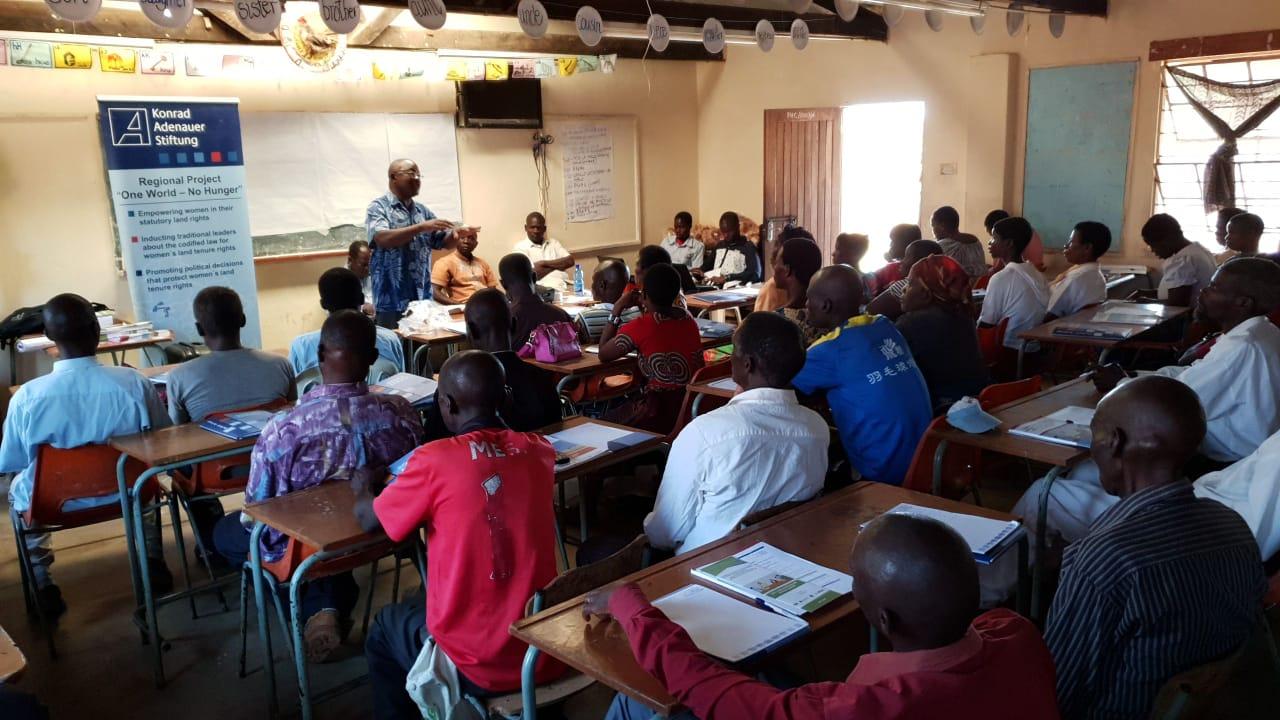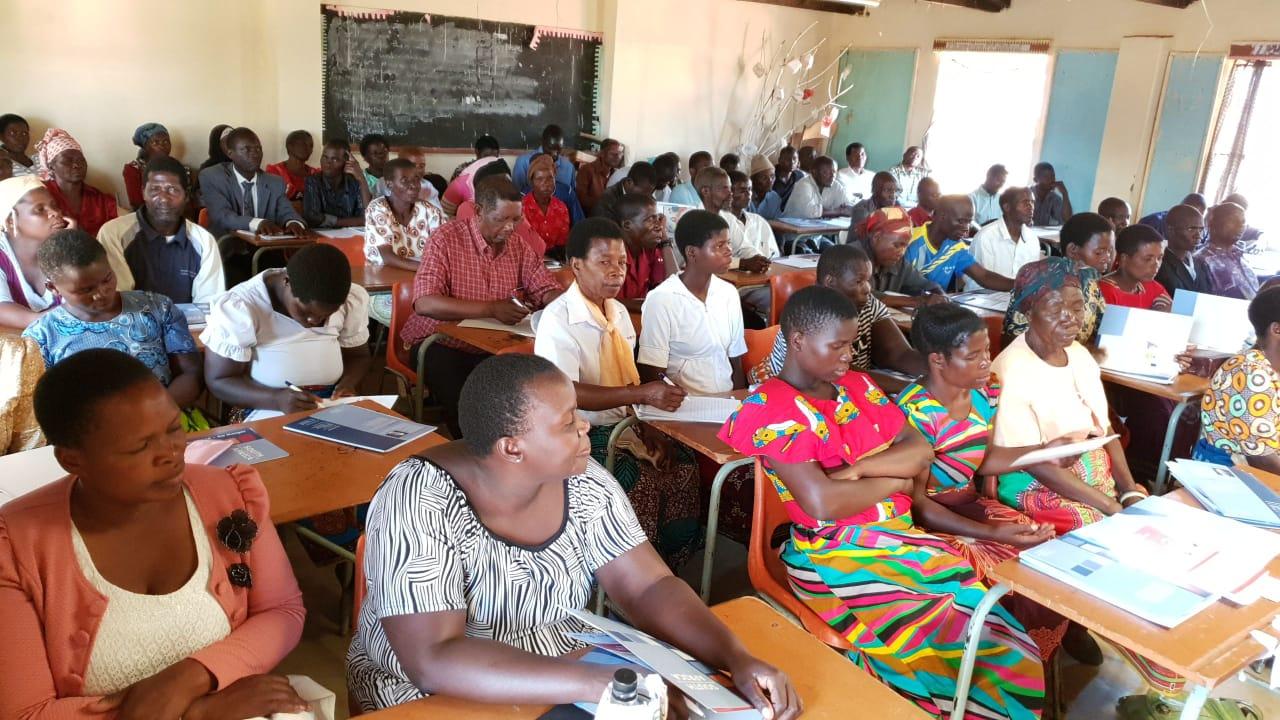Orientation training workshop for traditional leaders from Traditional Authority Mlumbe in Zomba (Malawi) - Foundation Office South Africa
Objective(s) of the activity
The training for traditional leaders in Zomba South was aimed to ensuring that traditional authorities increasingly consider the codified law and strengthen the position of women in issues of land use and land ownership. In its scope it was intended to cover key stages of the land law reform process in Malawi and how the new land law supports women’s land ownership rights.
Subject matter of measure
This ‘Orientation training workshop for traditional leaders’ on the legal (statutory) instruments supporting women’s land rights in Malawi was a fourth workshop in 2018 for Zomba targeting the lower two tiers, namely Group Village Heads and Village Heads.
Significance within overall project context
The workshop was significant as traditional leaders directly deal with issues of land allocation at the community level. As power bearers and primary authority, they are a strategic target in customary land allocation and resolution of land disputes.
Intended outcome
The intended outcome was that future actions of traditional leaders are within the codified law as protectors of women’s rights. It was anticipated that the training will result in a significant number of trained traditional leaders who will settle disputes according to the codified law and allocate land to women in their own right.
Implementation
The workshop was fully financed by KAS. For event organisation, KAS collaborated with the National Association of Smallholder Farmers of Malawi (NASFAM), while the LandNet Malawi land governance expert Mr. Emmanuel Mlaka was the workshop facilitator. The Chanco Community Radio recorded workshop proceedings and interviewed participants. The KAS Coordinator, Dr. Samson Lembani provided facilitation and logistical support.
Target group and actual participants
The workshop was conducted for two full days: 30th to 31st October 2018.Of the 75 participants who attended, 27 were female. They all came from Traditional Authority Mlumbe in Zomba. On first day more than 150 traditional leaders arrived as participants. NASFAM had to send back more than 75 self-invited participants to wait for another opportunity since they were not catered in the workshop budget. A Ward Councilor for the area, a pastor from the Presbyterian Church, and a police office also attended the workshop.
Content summary
The training content was delivered through interactive plenary discussions, group and panel discussions. Participants were free to contribute what they already knew and ask questions as each topic was delivered. The workshop covered following main session topics.
The National Context – Land Matters in Malawi. This topic was particularly relevant in enlightening participants on the causative issues for the land law review. It presented the current state of land pressure due to competing interests on land including fast population growth, land-based investments such as mining, agriculture and forestry, urban growth, etc., against an inelastic supply of land. It also discussed how the land pressure stimulates corruption in land deals and also how it impacts on both household and national food security for an agrarian society like Malawi, where food-crops are mostly grown by smallholder farmers on customary land, which despite accounting for 67% of the total land area of Malawi, it has no tenure security.
Historical background of land law review. This topic illustrated how the present land law and policy in Malawi is traced through the formal declarations of British colonial authority over Central Africa and how the natives lost ownership and control of land under the ambit of certificates of claim and the fiction that all land was vested in the British Monarch. The session zeroed in on processes the country has gone through since 1995 to reform the land sector resulting in the enactment of new legislations in 2016. Important for traditional leaders to understand in the historical review was:
- That land ownership and control was removed during colonization by the British leaving the natives with access and occupational rights only. It is the new land law that is giving power to control and secure tenure rights back to traditional leaders and citizens respectively.
- That the process was highly consultative and participatory across all sectors.
- That the new land law is a product of a number of pilot projects of how tenure security would be assured to both citizens and development actors.
Summary of key changes in the new land related laws. This session oriented participants on the new land law-especially the Customary Land Act and the Land Acquisition (Amendment) Act. The new land law provides equal opportunities and has specific provisions aimed at protecting women and children from land dispossession as well as provisions that allow the participation in land administration through democratically elected and gender-balanced customary land committees.
Gender inclusive provisions in the new land law. The discussion sensitized participants on several gender related provisions and their implications. The Customary Land Act (2016) protects women where it provides that “A surrender under this section which has, or for which it is reasonable to deduce that its purpose or effect is to deprive, or place impediment in the way of a woman from occupying land which she would, but for that surrender of land, be entitled to occupy under Customary Law or otherwise shall not be a valid surrender”. It also offers remedy to the woman, in the event that the husband surrenders his land with a view of either selling it and abandon the wife or giving it to his family members excluding the wife.
Assessment
Three tools were used to monitor level of achievement of the objectives of the activity:
Case Studies. In discussion groups on the first day, participants were asked to recount a case study on women land rights from their communities which occurred before the new land law and analyze how the matter was processed as well as the outcome. These cases were re-discussed after learning about women land rights in the new land law. The aim was to assess the level of comparative understanding in the changes brought about by the new law and the impact on the land rights for vulnerable women.
Panel Discussion. During the last session on the second day, a 25-minutes session was devoted to a panel discussion to test the level of understanding by the participants. The panel comprised the ADC Chair, two GVHs (male and female) and a female member of the ADC. The other participants asked random questions on women’s land rights while the panel responded based on the new Customary Land Act (2016).
Review of participant expectations and concerns. At the beginning of the workshop the facilitator received expectations and concerns of the participants when they were invited to attend the workshop. At the end of the workshop, participants were asked questions around these. They were able to correctly answer their own questions, an indicator that the workshop addressed most of their concerns.
Outcome
The real outcome from this workshop is observable in the medium to long term. It is anticipated that land law as newly codified will ensure that customary laws and practices that impede women’s rights become illegalised and punishable by law. The women who attended the workshop were empowered to champion women land rights advocacy and are now knowledgeable on what to do once their land rights are violated or denied. It is also envisaged that the male traditional leaders would become champions of women land rights in their areas of jurisdiction.
Conclusion
The uninvited traditional leaders numbering more than those invited and their reluctance to be sent back is a clear indication of a spill-over effect of previous similar orientation and public meetings in a neighbouring Traditional Authority Chikowi that generated interest to know and understand the new land law. The voluntary participation by a key traditional leader from the neighbouring community where similar orientation had taken place previously, and his inspiring speeches to fellow chiefs was a great motivation to this community. The chief came from a distant community at his own cost. Finally, the request by chiefs to the comedy group to be available to display during subsequent community gatherings was a clear indication that the community leaders had positive plans to popularise the new land law.







